Make it yours
Every experience is customised to be just right for you.
WILDLIFE VOLUNTEERING: THE RED FLAGS MOST PEOPLE MISS
Learn more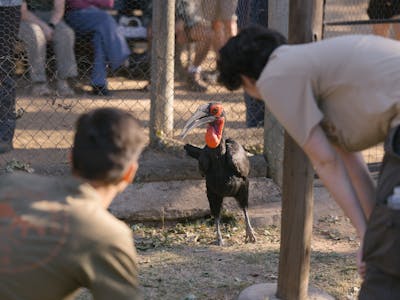
An immersive introduction to animal care and professional husbandry skills, this field trip gives students the opportunity to gain practical work experience in one of Africa’s largest animal rehabilitation centres - before heading into the bush to learn how these species are conserved in the field.
Living and working in a busy facility that cares for over a hundred permanent animal residents, students will receive mentorship and training from experienced animal care professionals. From diet and feeding to habitat enrichment and maintenance, students will learn the professional techniques and high standards essential for supporting recovery and welfare - all while working collectively toward release, where possible.
To connect this work with wider conservation goals, students will spend time in a nearby research camp, where they’ll see how rehabilitated species are monitored and protected in the wild. Along the way, they’ll get the chance to connect with experts, ask questions, and understand what it takes to build a successful career in the animal care sector.



Students will join the full-time team in a wildlife care and rehabilitation centre, assisting them with all aspects of hands-on animal care. Learning from experienced professionals will give your group a chance to develop real-world skills in animal welfare and management.
As well as caring for iconic species and improving their quality of life in a wildlife rehabilitation centre, this field trip introduces students to life in the African bush where they can see species in their natural habitat and learn how to conserve them in the wild.
Caring for and monitoring animal populations is a vital element of wildlife conservation. Whether students are treating the wing of an injured eagle or using camera traps to monitor the movement of elusive species like leopards, they will be engaged in valuable work.
Throughout your expedition, students will apply their theoretical learning to real practical problems. They will also have time to debate the ethical questions that working conservationists and animal care professionals grapple with daily.
Living at the centre offers students deeper insight into the day-to-day running of an animal care facility and the challenges, ethical decisions, and teamwork involved - as well as the emotional complexities of working with rescued animals. This behind-the-scenes insight gives students a clear perspective on life as an animal care professional.
Live and work on a real wildlife research project within the Greater Kruger area - one of Africa’s most biodiverse and ecologically important regions and the perfect example of why large connected landscapes are vital to maintain genetic diversity and large populations of species like lions and elephants.
This is a suggested itinerary. Every field trip can be customised to be just right for you and your group.
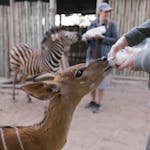
Welcome to one of Africa’s largest wildlife sanctuaries - and your group’s home for the start of your field trip. Moholoholo rescues, rehabilitates and releases a wide range of injured species - and provides lifelong care for those that cannot go back to the wild. Living in the centre itself, students will fall asleep to the sounds of lions roaring and hyenas whooping! This immersive experience creates a deeper connection with the residents (both animal and human) living in this world-renowned centre.

Students will get involved in all aspects of wildlife care and rehabilitation. They’ll gain first-hand experience preparing nutritionally balanced diets, providing hands-on assistance with feeding, enriching animals’ lives by creating a natural setting in captivity, as well as the daily cleaning and mucking out of animal enclosures.
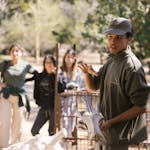
Throughout this field trip, students will engage in talks and debates about important conservation topics. From the bird of prey crisis, the history of Moholoholo and the vital role animal care plays in wildlife conservation to the ecology of the Greater Kruger area and ethical questions around elephant overpopulation and whether hunting still has a place in modern-day conservation.
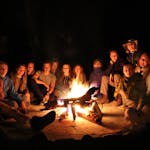
Welcome to your off-grid base camp, deep in the Greater Kruger National Park - home to the Big 5 plus hippo, giraffe and wild dog among others. Your group will have exclusive use of your camp with accommodation in safari tents with comfortable beds. Throughout your stay, students will help prepare meals, wash dishes, and keep the camp clean and running smoothly - a great way to learn important life skills. Evenings are usually spent around a crackling fire, soaking in the sounds of the bush at night.
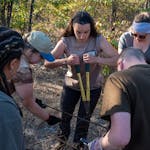
Removing invasive plant species is vital for protecting biodiversity, as they can outcompete native plants and disrupt natural processes. By eliminating invasives, students will help restore and improve habitats for native species, and ensure the overall health of the ecosystem. Clearing out old fencing material is just as important, as this can be used by poachers to create snares or entangle wildlife leading to injury or death. By extracting this material students will actively save the lives of African wildlife.
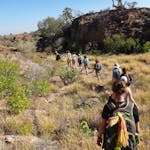
Head into the bush on foot and gain insight into how wildlife is effectively protected and monitored on the ground. While on the walk, students will help look for snares and other signs of poaching activity. (Don’t worry, this is a safe activity focused on learning not encountering poachers!) Students will also learn how to recognise and identify animal tracks out in the wild - vital skills in any game ranger’s toolbox.
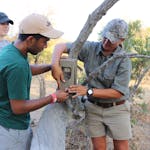
Assist the rangers in setting up camera traps to carry out real-time monitoring of wildlife. Head out on game drives to learn how to use digital and hard-copy maps to apply sampling techniques and record species’ presence. And practice real-world scientific data collection skills while observing a diverse range of species at a watering hole.
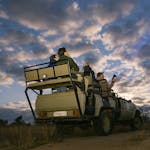
Embark on a thrilling night drive to search for nocturnal species such as bushbabies, leopards and hyenas. Learn how to use a spotlight to find these species while ensuring no negative impact on the animals. Then enjoy an astronomy lesson under the vast African sky where students will learn to identify constellations visible in the southern hemisphere.
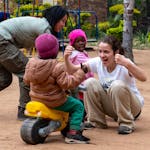
Spend the morning at a local NGO which offers a crèche to support children while their parents work on nearby farms. Students will get to help in the food garden, assist with the upkeep of the centre, and support educational playtime with the children. The time they spend at the creche is an opportunity for everyone to learn more about different cultures and engage in meaningful exchange.
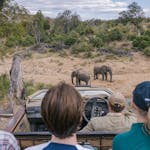
Exploring the public areas of the National Park in open-sided safari vehicles with expert guides, students will have an incredible opportunity to see some of Africa’s most iconic wildlife up close. This excursion offers students the chance to encounter wildlife species they haven’t yet seen and deepen their understanding of the national park’s rich biodiversity.
Learn a variety of professional husbandry techniques that promote high levels of animal welfare throughout every stage of an animal’s care and rehabilitation journey - including animal diets and how to safely carry out feeding rounds, enclosure cleanliness and enrichment, and observing specific veterinary treatments.
Gain practical experience providing hands-on care for iconic African species, from large predators and megaherbivores to grazing prey species, reptiles and birds of prey.
Gain behind-the-scenes insights into how a large animal care and rehabilitation sanctuary is operated and managed on a daily basis.
Learn how research and monitoring are essential for the effective conservation of African wildlife species in their natural habitat.
Gain an in-depth understanding of the role animal care and rehabilitation centres play in the broader picture of African wildlife conservation.
Explore the behavioural differences between animals in a natural environment and those living in captivity.
Discover the relationship between predator, prey and plant species, and the impact of one species' population growth or decline on the ecosystem as a whole.
Related field trips
Explore programs similar to this one.
Expand your students’ experience by supporting real wildlife vets in the field
View details for Veterinary Medicine In Conservation Field TripGive your students a broad taste of life working in African wildlife conservation projects
View details for Biology & Ecology Kruger Fieldwork TripChallenge your students by joining internationally relevant conservation projects
View details for Global Citizens CAS Field TripWork hands-on to support conservation projects alongside local communities
View details for Changemakers Service Learning Trip